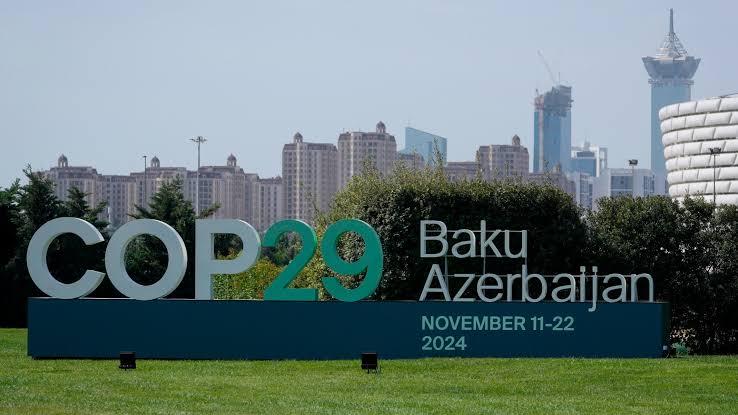Dr Md Kamruzzaman Milon
Published:2024-11-28 02:23:35 BdST
COP29: World’s Climate Ambitions and Realities
The 29th United Nations Climate Change Conference (COP29), hosted in Baku, Azerbaijan, was a pivotal moment in the global climate dialogue.
Amidst rising temperatures, escalating natural disasters, and deepening vulnerabilities, the summit carried immense expectations from nearly 200 nations.
For vulnerable countries, including Bangladesh, the outcomes of COP29 were more than mere policy decisions—they were lifelines for survival.
However, while the conference achieved significant milestones, it left critical questions unanswered, reflecting the on-going struggle between ambition and political realities in tackling the climate crisis.
Climate finance was a dominant focus at COP29, as developing countries demanded a substantial increase in financial commitments from wealthier nations.
The $100 billion annual pledge made over a decade ago to support vulnerable regions remains unmet. This failure has eroded trust between developed and developing nations.
In response, COP29 marked a significant step forward by establishing a new climate finance target of $300 billion annually by 2035. This fund aims to address loss and damage, bolster adaptation efforts, and drive mitigation initiatives.
For countries like Bangladesh, which grapple with rising sea levels, increased salinity and intensified cyclones, such financial support is crucial. The country’s delegation at COP29 emphasised the need for immediate and substantial funding to build resilience in agriculture, infrastructure, and coastal management.
While the $300 billion target offers hope, it has also drawn criticism for being insufficient relative to the scale of climate-related damages.
Many experts argue that without swift implementation mechanisms and equitable allocation, the fund’s potential impact may remain limited. The absence of a clear roadmap for disbursing these funds adds to the uncertainty.
Another area where COP29 made progress was in carbon market mechanisms under Article 6 of the Paris Agreement. Carbon markets allow countries to trade emissions offsets, providing flexibility in achieving their climate goals.
The agreement at COP29 was seen as a step forward, potentially encouraging investment in renewable energy and conservation projects. However, concerns persist about the transparency and integrity of these markets.
Critics warn that loopholes in the system could allow countries to avoid genuine emissions reductions, undermining global climate goals.
Adaptation gained significant attention at COP29. Vulnerable nations have long argued that adaptation is not merely an option but a necessity, given the irreversible impacts of climate change already being felt.
The conference saw commitments to enhance early warning systems, invest in climate-resilient infrastructure, and promote nature-based solutions.
These measures are particularly critical for countries like Bangladesh, where climate impacts directly threaten millions of lives and livelihoods.
Despite these achievements, COP29 fell short in several key areas, particularly in addressing the root cause of the climate crisis: fossil fuels. The call for a global phase-out of coal, oil, and gas faced strong resistance from major emitters, including China, India, and Saudi Arabia. These nations argued that their economic development and energy security needs require a more gradual transition. As a result, COP29 failed to secure a consensus on fossil fuel reduction.
The conference also highlighted the disparity in climate action responsibilities and resources. Developing nations, which contribute the least to global emissions but suffer the most severe impacts, expressed frustration over the lack of equity in decision-making.
They argued that wealthier nations, historically responsible for the majority of greenhouse gas emissions, must take greater responsibility in providing financial and technical support.
The principle of "common but differentiated responsibilities," a cornerstone of global climate agreements, was at the forefront of these discussions. However, the lack of significant movement on this front deepened the divide between developed and developing nations.
For Bangladesh, COP29 was a critical platform to advocate for resources and support to combat its unique climate challenges. Bangladesh’s delegation called for immediate access to adaptation funds, emphasising that delays could have catastrophic consequences.
While the outcomes of COP29 offered some hope, they also underscored the need for more ambitious and equitable action to address the country’s urgent needs.
The issue of loss and damage, a contentious topic at previous COP summits, saw some progress at COP29. Building on the historic agreement at COP27 to establish a Loss and Damage Fund, COP29 outlined preliminary steps for operationalizing the fund.
This fund is intended to provide financial assistance to countries facing irreparable climate impacts. Nevertheless, the lack of clarity on governance structures and funding sources remains a significant challenge. Without robust mechanisms to ensure accountability and effectiveness, the fund risks becoming another unfulfilled promise.
The influence of fossil fuel lobbyists at COP29 also drew widespread criticism. Reports indicated a substantial presence of representatives from the oil and gas industry, raising concerns about their role in shaping climate policies.
The outcomes of COP29 reflect the complexities of global climate negotiations. While the agreements on climate finance and adaptation signal steps in the right direction, the lack of progress on fossil fuel reduction and emissions targets highlights the work that remains. For vulnerable nations like Bangladesh, the stakes are existential.
The decisions made at COP29 must translate into tangible actions to protect lives, secure livelihoods, and ensure a sustainable future.
As the world looks toward COP30, the message is clear: incremental progress is no longer enough. The climate crisis demands bold, decisive action—action that prioritizes equity, ambition, and a shared commitment to safeguarding the planet.
The writer is a Senior Scientist and Agri-climate Expert, Bangladesh Rice Research Institute
Unauthorized use or reproduction of The Finance Today content for commercial purposes is strictly prohibited.


